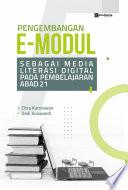
Pengembangan E-Modul Sebagai Media Literasi Digital Pada Pembelajaran Abad 21
Perkembangan teknologi mengubah orientasi belajar dari pembelajaran konvensional menjadi pembelajaran digital. Perubahan ini seiring dengan integrasi strategi pembelajaran dengan Information and Communication Technologies (ICT). Penyajian serba digital pada perkembangan pembelajaran abad 21 akan berdampak terhadap stategi pembelajaran seperti halnya konten pembelajaran. Konten pembelajaran berbasis digital dapat dibuat dalam bentuk e-book atau e-modul. Buku ini terdiri dari enam bab utama beserta subbab dengan pembahasan yang telah disesuaikan dengan kerangka kajian pengembangan yang sederhana. Dengan diterbitkannya buku ini maka diharapkan dapat menjadi sumber kajian pengembangan e-modul untuk para pengajar dan praktisi pendidikan dalam mengembangkan naskah digital guna memaksimalkan literasi digital
- ISBN 13 : 6239639257
- ISBN 10 : 9786239639259
- Judul : Pengembangan E-Modul Sebagai Media Literasi Digital Pada Pembelajaran Abad 21
- Pengarang : Citra Kurniawan, Dedi Kuswandi, Dedi Kuswandi, Dedi Kuswandi, Dedi Kuswandi, Dedi Kuswandi, Dedi Kuswandi, Dedi Kuswandi,
- Kategori : Education
- Penerbit : Academia Publication
- Bahasa : id
- Tahun : 2021
- Halaman : 104
- Google Book : https://play.google.com/store/books/details?id=RfgvEAAAQBAJ&source=gbs_api
-
Ketersediaan :
Perkembangan teknologi mengubah orientasi belajar dari pembelajaran konvensional menjadi pembelajaran digital.









